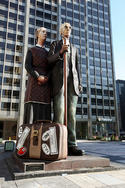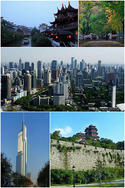I recently moved to Providence, Rhode Island, where I live in the town of West Warwick. I’ve been learning the place more and soaking in New England culture (and seafood). This area has a Rust Belt type profile: declining population, post-industrial economic landscape, high unemployment, etc. So I’ve been trying to get a handle on conditions and think a bit about what the opportunities are. read more »
Economics
Cooling Off: Why Creative California Could Look to Western New York
Sometimes the stakes are bogus, sometimes the fast lane hits a fork.
Sometimes southern California wants to be western New York
–Lyrics from Dar Williams’ song “Sometimes California Wants to Be Western New York”.
For long, making cultures and making people have been deemed outmoded. It is largely a knowledge economy. And since knowledge has been diverging into “spiky locales” known to be hotbeds of innovation, consider it a double whammy, as most of the relevant geographies are on the coast. The middle of the country is thus irrelevant if you care to survive. It is a man with a pitchfork in a sea of MacBook’s and iLife’s. read more »
Baseball Vs Basemall: Goodbye to the Games of Summer
Even if the best-seller Fifty Shades of Grey did draw more fans than the Olympics (both sports involve “play parties” and metallic neckwear), the nominal American summer game is baseball. But that celebration of agrarian mythology and fields of dreams has descended to the level of a cable infomercial: white noise blended with car sales promotions, insurance deals, and breakfast cereals. read more »
Here's Why People Don't Think We're in a Recovery
The most recent jobs report was again below consensus. With fewer than 100,000 new jobs, unemployment fell only because people continue to leave the labor force in huge numbers. People are discouraged, and many don't believe we are in a recovery. Why would they think that we aren't in a recovery? After all, GDP is above its pre-recession high, and we hear all the time about how many jobs have been created over the past couple of years. read more »
The End of the Road for Eds and Meds
In the last few decades, as suburbanization and deindustrialization devastated so many cities, they turned to two sectors that seemed not only immune to decline, but were actually growing: universities and hospitals. The so-called “eds and meds” sectors, often related through university affiliated hospitals, became a great stabilizer for many places. read more »
The State of Economy in the Swing States
I was living in Pennsylvania, voting in my second presidential election when my mom asked me that question in the months leading up to Ronald Reagan’s defeat of Jimmy Carter: “Are you better off today than you were four years ago?” Four-year-ago comparisons are tricky when the worst financial collapse in my lifetime occurred four years ago. Comparing the swing states not to their conditions four years ago, but how they might feel compared to the rest of the nation, Virginia, Colorado and New Hampshire appear to be “better off” than the average American. read more »
The Growing Number of Freelancers in Entertainment
When people were preparing eulogies for the entertainment sector, Techdirt’s Mike Masnick popped out with his bold piece, “The Sky is Rising,” and poked holes in the gloomy forecast. His scrutiny of the numbers revealed that the entertainment industry is actually growing. Entertainment consumption per household increased from 2000 to 2008. Employment in the entertainment sector jumped 20% from 1998 to 2008. And the number of independent artists rose 43% over the same period. read more »
Barack Obama’s New Chicago Politics Abandon Bill Clinton’s Winning Coalition
While the Democratic convention this week celebrates the party’s new coalition, Bill Clinton will no doubt try to recapture the white middle class that’s largely deserted the Democrats since his presidency ended. But it’s likely his efforts will be a case of too little, too late for Barack Obama—who will have to look elsewhere for his electoral majority. read more »
Livable China
Recently, the McKinsey Global Institute published its report 'The Most Dynamic Cities in 2025' in Foreign Policy, a highly respected US journal. On this list, 27 mainland Chinese cities as well as Hong Kong took top spots alongside Shanghai and Beijing, leaving many other world-renowned metropolises far behind.
As a Chinese who has lived through China's transformation over the past two decades, I was hardly surprised by the results of this report. What really shocked me was the doubt and controversy that this report generated in western media, especially the negativity in the heated discussions published in the very same issue of Foreign Policy. read more »
The Unseen Class War That Could Decide The Presidential Election
Much is said about class warfare in contemporary America, and there’s justifiable anger at the impoverishment of much of the middle and working classes. The Pew Research Center recently dubbed the 2000s a “lost decade” for middle-income earners — some 85% of Americans in that category feel it’s now more difficult to maintain their standard of living than at the beginning of the millennium, according to a Pew survey. read more »






















